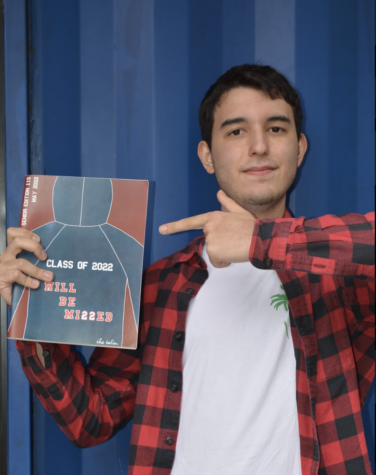A Guide to Doing the Right Thing, For Yourself & Others
There are so many fantastic books in the world. This article, in particular, is about a very special book, Jordan Peterson’s “12 rules for life: An Antidote to Chaos”. I’ve read plenty of books in quarantine but this one is special because it helped improve my life and I hope it can improve yours in such a challenging time. Quarantine for most of us started on a Friday, and for me, I had just stepped out of the bus. I couldn’t explain why back then, but the ride felt strange. Some things were normal like the fact that I was sitting with my friend and we were on our usual route. But what wasn’t normal about that Friday was that it was going to be the last time I would be seeing Graded for a while.
But why cry over spilled milk? Looking back, I can say that quarantining allowed me to grow as a person. I consider myself to be happier and more knowledgeable than before isolation —to put it simply, my life is better now. I picked up yoga, meditated, and watched many good TV shows– by many, I mean many. Of course, though, quarantine can be hard on the mind. There’s no denying that life is different than it was back in March. However, what’s to stop us from promoting positivity? What’s to stop us from being happy? You may still be feeling overwhelmed with quarantine right now, so how about we establish ground rules in these chaotic times? I read a book that might help; it’s called 12 Rules For Life: An Antidote to Chaos.
But wait a second, more rules? Although rules can be restricting (the author Jordan Peterson starts the book with this question) and his response is that the rules in his book are meant to help you live a happy life instead of being an obstacle.
Rule 8 for instance is “Tell the truth– or, at least, don’t lie”. Have you ever been in a tricky situation where telling the truth is harder than lying? If I told you that telling the truth is always the right thing to do, would you believe me? Peterson found himself in one of these circumstances. When Peterson visited Montreal’s Douglas Hospital as a university student learning psychology, one of the patients at the facility asked to join his study group. He chose to tell the truth; that he and his colleagues were training to become psychologists, and the patient couldn’t join them. In another incident, Peterson had a friend, Denis, who drank a lot. He would show up late at night to sell many of his belongings to Peterson and his wife Tammy in order to feed his alcoholism, and in order to help him out, the couple came to the conclusion that his tendencies were wrong and even resulted in Tammy being scared. As they confessed these thoughts to Denis, their friendship prospered, they surpassed the challenges because Peterson told the truth– or at least, didn’t lie.
How can we apply this same advice in our lives? Think about a situation in school. You have a class that is very demanding, where you have to do an excessive amount of homework, and your grades in said class aren’t to your standards. The simplest option would be to keep working hard. But for your own well-being, you need to think about what the best course of action is by truthfully weighing the costs and benefits between studying or self-care. From there, you can make the best decision for yourself because you will be truthful. Consider another situation where you are swarmed in after-school activities, clubs, and volunteer work. You need to ask yourself if you can handle all of it, and whether or not having such a large number of activities at the same time benefits you. Being honest with yourself will help you determine if you should drop some of these activities or if you can better administer your schedule and keep all your activities. At home, maybe your parents want you to go to the mall with them on Sunday. You have a lot of homework, though. If you tell them that you’ll go with them, you’re ignoring that you have a lot of work to do. Inversely, if you stay, you miss the chance to spend time with your family. Be honest with yourself, and in this case, with your parents as well, and think about what is truly most beneficial.
Allow me to give you an example from my own life. Whilst writing this article I stumbled upon a New York Times piece about Jordan Peterson. In it, the author talks about many of Peterson’s conservative views. When I read it, I felt discouraged, my first reaction was to discredit Peterson’s work, but that’s when I realized that that wasn’t the point. After all, right now as I am writing this article, I am also using one of his rules, by being truthful about my experience with a writer who perhaps doesn’t share my values. While Peterson may be a controversial figure due to his views and values, his work is still valuable. His rules work.
This is just one of the many life lessons in the book. If someone walked up to me and asked me to summarize it in just one sentence, I would say that the book is asking all of us to do the right thing. Do the right thing for ourselves, and do the right thing for others. This request might seem simple at first glance, but it’s actually incredibly important. It serves as a guide when people have lost their compasses. It provides a basis when it is hard to find stability in life. These rules can be our safety blanket. It’s sad to think that months have passed since we’ve seen our friends in person, but we have a lot to gain from quarantine. When we stop to reflect on our lives, we have the chance to improve it. So, if you want to find a little more meaning amidst all the chaos, read Jordan Peterson’s book 12 Rules for Life; now’s a golden opportunity, don’t you think?

Returning for his third year in The Talon as Editor-in-Chief, Diego is continuing to work for the magazine he loves, leading the EB this year. Biggy...












Diego • Oct 28, 2020 at 12:53 pm
Hey Everyone!
Thank you so much for the Heartwarming and Encouraging words! The best part of being a writer is to know that your article resonates with people. I hope you got something from the 12 rules for Life that stretches beyond this article. There’s more on the way. Stay Tuned!
kind regards,
Diego Cortese
Diego Cortese • Oct 28, 2020 at 12:52 pm
Hey Everyone!
Thank you so much for the Heartwarming and Encouraging words! The best part of being a writer is to know that your article resonates with people. I hope you got something from the 12 rules for Life that stretches beyond this article. There’s more on the way. Stay Tuned!
kind regards,
Diego Cortese
Nati • Oct 14, 2020 at 5:15 pm
Diego, what a nice piece of work!! I love the way you interpreted the article with your own thoghts!!
Keep true to yourself, you won’t regreat a thing.
Nati 🙂
Diego Quinto • Oct 9, 2020 at 11:19 pm
Niiiiicee Diego!!!! Solid work! Loved the article., keep it up!
Kevin Maykut • Oct 9, 2020 at 9:01 pm
What a great article! It was a positive and upbeat piece of journalism! Bravo!
Andrea Colsato • Oct 7, 2020 at 8:50 pm
Quando eu estava no ensino médio, havia um livro que fazia o mesmo papel desse que você leu, mas acho que num sentido ruim tanto pra mim quanto pra maioria das pessoas que o leram e ganhou até uma expressão “ síndrome de Poliana”. Minha geração foi bem mais pessimista do que a sua, talvez aí esteja a explicação pra um criticismo idiota que nutrimos naquela época.
Mark Hillman • Oct 3, 2020 at 4:54 pm
Hey Diego,
For me, this past 7 months have been very challenging and it reminds me, like my cancer fight a few years ago, of the power of relationships. Life is uncertain or maybe another way to think about it is that the certainty in life is the uncertainty. Anyway, I found solace and encouragement in a family game night, a (socially distanced) walk in nature with an old friend, and in going out for virtual coffee with friends around the world.
Does this book mention building and maintaining relationships as one of the 12 rules for life?
Mr. Hillman
Marcello Bulgarelli • Oct 2, 2020 at 7:17 pm
Great article, Diego! Loved how you acknowledged that there were some positive aspects in what you were criticizing.